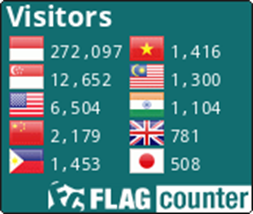Factors of Using Non-Cash Payments to the Consumption Level of Students in Pematangsiantar City
DOI:
https://doi.org/10.26905/jbm.v7i1.4041Keywords:
perceived usefulness, perceived ease of use, perceived trust, consumption levelAbstract
This study aims to determine the factors of the use of non-cash payments to the consumption levels of Pematangsiantar City students. In this study the level of student consumption as the dependent variable and the factors of using non-cash payments are perceived usefulness, perceivedease of use and perceived trust as independent variables. The population in this study were students of Accounting Department in the seventh semester at STIE Sultan Agung Pematangsiantaras many 167 people. This study used quantitative data in the form of a questionnaire. Data analysis techniques used in this research are classic assumption test, multiple linear regression, determination test, F test and t test.The results showed that the perceived usefulness, perceived ease of use and perceived trust had a positive and significant effect on student consumption levels. This is because students prefer to make any purchases (consumption) using non-cash payments. The benefits of non-cash payments can be used anywhere, easy to carry, more secure and has trust in the accuracy of the transactions madeDownloads
References
Acheampong, P. et al. (2017) ‘Hybridizing an Extended Technology Readiness Index with Technology Acceptance Model ( TAM ) to Predict E-Payment Adoption in Ghana’, American Journal of Multidisciplinary Research, 5(2), pp. 172–184.
Aksami, Ni Made Dwi, Jember, I Made. (2019). Analisis Minat Penggunaan Layanan E-Money Pada Masyarakat Kota Denpasar. E-Jurnal Ekonomi Pembangunan Universitas Udayana. Volume 8, Nomor 9, Oktober.
Chawla, D., & Joshi, H. (2019). Consumer attitude and intention to adopt mobile wallet in India – An empirical study. International Journal of Bank Marketing, IJBM-09-2018-0256. https://doi.org/10.1108/IJBM-09-2018- 0256.
Davis, F. D., Bagozzi, R. P., & Warshaw, P. R. (1989). User Acceptance of Computer Technology: a Comparison of Two Theoretical Models. Management Science. Aug1989, 35(8), 982–1003.
Fajrian, Hilman. (2015). “30% Lebih Boros Dengan Non Tunaiâ€. (http://www.kompasiana.com/hilmanfajrian/30lebihborosdengannontunai_55711ada2523bdf632584818). Diakses 10 Nopember 2019. https://www.wartaekonomi.co.id/read178529/industri-40-geser-perilaku-transaksi-pembayaran.html. Diakses pada tanggal 10 Nopember 2019.
Hasibuan, A. et al., 2020. E-Business: Implementasi, Strategi dan Inovasi. Cetakan 1. Medan: Yayasan Kita Menulis.
Jati, R Wasisto. (2015). “Less Cash Society: Menakar Mode Konsumerisme Baru Kelas Menengah Indonesiaâ€. Jurnal Sosioteknologi. Vol 14. No 2.
Kesharwani, A. & Shailendra, S. B. (2012). The Impact of Trust and Perceived Risk on the Internet Banking Adoption in India. International Journal of Bank Marketing, 30(4), 303-322. https://doi.org/10.1108/02652321211236923.
Khairi, Miftahul Rizqa, Gunawan, Eddy. (2019). Analisis Penggunaan Alat Pembayaran Menggunakan Kartu (APMK) dan E-Money Terhadap Konsumsi Masyarakat di Banda Aceh. Jurnal Ilmiah Mahasiswa Ekonomi Islam. Volume 1, Nomor 1, Maret.
Lau, G. T., & Lee, S. H. (1999). Consumers’ Trust in a Brand and the Link to Brand Loyalty. Journal of Market-Focused Management, 4(4), 341–370. https://doi.org/10.1023/A:1009886520142
Lin, C. and Nguyen, C. (2011) ‘Exploring e-payment adoption in Vietnam and Taiwan’, Journal of Computer Information Systems, 51(4), pp. 41–52. doi: 10.1080/08874417.2011.11645500.
Lintangsari, Nastiti Ninda, Nisaulfathona Hidayati, Yeni Purnamasari, Hilda Carolina, Wiangga Febranto. (2017). Analisis Pengaruh Instrumen Pembayaran Non-Tunai Terhadap Stabilitas Sistem Keuangan Di Indonesia. Semarang: UNDIP.
Ming, W. et al. (2016) ‘Factors Affecting Consumers’ Perception of Electronic Payment: an Empirical Analysis’, Internet Research, 23(4), pp. 465–485.
Ndraha, Ester. (2019). Pengaruh Kemampuan Finansial dan Keamanan Terhadap Minat Penggunaan Produk E-money (Studi Kasus) Pada Mahasiswa Universitas HKBP Nommensen Medan. Medan: Universitas HKBP Nommensen.
Nelasari. R.P., & Cahyono, H. (2018). Pengaruh Sistem Transaksi Non Tunai Terhadap Tingkat Konsumsi Masyarakat Di Surabaya. Jurnal Ekonomi Islam, 1(2). 165-171.
Ramadani, Laila. (2016). Pengaruh Penggunaan Kartu Debit dan Uang Elektronik (E-Money) Terhadap Pengeluaran Konsumsi Mahasiswa. JESP-Vol.8, No.1 Maret 2016.
Ronny (2018) ‘Customer participation in the creation and implementation of the service for internet banking’, Journal of Economics, Business & Accountancy Ventura, 20(3), pp. 309–317. doi: 10.14414/jebav.v20i3.763.
Rukmana, Rismawati D. (2016). Jurnal Dampak Perkembangan Pembayaran Non Tunai Terhadap Pertumbuhan Ekonomi Indonesia. Malang: UNBRAW.
Rumondang, A. et al. (2020). Fintech: Inovasi Sistem Keuangan di Era Digital. Medan: Yayasan Kita Menulis.
Sayekti, Fran & Pulasna Putarta. (2016). Penerapan Technology Acceptance Model (TAM) Dalam Pengujian Model Penerimaan Sistem Informasi Keuangan Daerah. Jurnal Manajemen Teori dan Terapan. 9(3), 196-209.
Sekaran, Umar. 2006. Research Methods For Business. Edisi Keempat. Jakarta: Salemba Empat.
Setiani, Rahayu. (2018). Faktor- Faktor Yang Mempengaruhi Penggunaan Alat Pembayaran Non Tunai (Studi di Kota Purbalingga). Yogyakarta: Unviersitas Islam Indonesia. Skripsi.
Sugiyono. (2014). Metode Penelitian Kuantitatif Kualitatif dan R&D. Bandung: Alfabeta.
Wagner. (2009). Gaya Hidup “Shopping Mall†sebagai Bentuk Perilaku Konsumtif Pada Remaja di Perkotaan: Kasus Konsumen Remaja di Tiga One Stop Shopping Mall di Jakarta. Skripsi tidak diterbitkan. Institut Pertanian Bogor.
Wasiaturrahma, W., Wahyuningtyas, Y. T. and Ajija, S. R. (2019) ‘Non Cash Payment and Demand for Real Money in Indonesia’, Journal of Economics, Business & Accountancy Ventura, 22(1), pp. 1–8. doi: 10.14414/jebav.v22i1.1575.
Wibowo, Setyo Ferry, Dede Rosmauli and Usep Suhud. 2015. Pengaruh Persepsi Manfaat, Persepsi Kemudahan, Fitur Layanan, dan Kepercayaan Terhadap Minat Menggunakan E-Money Card (Studi Pada Pengguna Jasa Commuterline di Jakarta). Jurnal Riset Manajemen Sains Indonesia, 6(1), pp. 440-456. https://doi.org/10.21009/JRMSI.006.1.06
www.bi.go.id. Diakses pada tanggal 10 Nopember 2019
Downloads
Published
How to Cite
Issue
Section
License
Authors who publish with this journal agree to the following terms:
(1) Copyright of the published articles will be transferred to the journal as the publisher of the manuscripts. Therefore, the author confirms that the copyright has been managed by the journal.
(2) Publisher of Jurnal Bisnis dan Manajemen is University of Merdeka Malang.
(3) The copyright follows Creative Commons Attribution–ShareAlike License (CC BY SA): This license allows to Share — copy and redistribute the material in any medium or format, Adapt — remix, transform, and build upon the material, for any purpose, even commercially.














